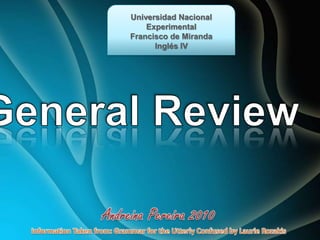
General review
- 1. Universidad Nacional Experimental Francisco de Miranda Inglés IV General Review Andreina Pereira 2010 InformationTakenfrom: GrammarfortheUtterlyConfusedby Laurie Rozakis
- 2. General Review Adjectives Adjectives are words that describe nouns and pronouns. Adjectives answer the questions: What kind? How much? Which one? How many? For example: What kind? red nose gold ring How much? moresugar little effort Which one? secondchance thosechocolates How many? several chances six books
- 3. General Review There are five kinds of adjectives: common adjectives, proper adjectives, compound adjectives, articles, and indefiniteadjectives. Adjectives 1. Common adjectives describe nouns or pronouns. strongman greenplant beautifulview 2. Proper adjectives are formed from proper nouns. California vegetables (from the noun “California”) Mexican food (from the noun “Mexico”) 3. Compound adjectives are made up of more than one word. far-off country teenageperson 4. Articles are a special type of adjective. There are three articles: a, an, the. The is called a “definite article” because it refers to a specific thing. A and an are called “indefinite articles” because they refer to general things. Use a with consonant sounds; use an before vowel sounds. 5. Indefinite adjectives don’t specify the specific amount of something. allanotheranyboth eacheitherfewmany more mostneitherother severalsome
- 4. General Review Adjectives Follow these guidelines when you use adjectives: 1. Use an adjective to describe a noun or a pronoun. Jesse was unwilling to leave the circus. 2. Use vivid adjectives to make your writing more specific and descriptive. Take a larger slice of the luscious cake. 3. Use an adjective after a linking verb. A linking verb connects a subject with a descriptive word. The most common linking verbs are be (is, am, are, was, were, and so on), seem,appear, look, feel, smell, sound, taste, become, grow, remain, stay, and turn. Chicken made this way tastes more delicious (not deliciously). TIP
- 5. General Review Adverbs Adverbs are words that describe verbs, adjectives, or other adverbs. Adverbs answer the questions: When? Where? How? or To what extent? When? left yesterdaybegin now Where? fell belowmove up How? happily sang danced badly To what extent? partly finished eat completely
- 6. General Review Adverbs Follow these guidelines when you use adverbs: 1. Use an adverb to describe a verb. Experiments using dynamite must be done carefully. 2. Use an adverb to describe an adjective. Sam had an unbelievably huge appetite for chips. 3. Use an adverb to describe another adverb. Theysangso clearly. TIP Conjunctive adverbs are used to connect other words and to link ideas and paragraphs: Accordingly, again, also, besides, consequently ,finally, for example, furthermore, However, indeed, moreover, on the other hand, otherwise, nevertheless, then, therefore
- 7. General Review PossessiveNouns In grammar, possession shows ownership. Follow these rules to create possessive nouns. 1. With singular nouns, add an apostrophe and an s. dog -> dog’sbone singer -> singer’svoice 2. With plural nouns ending in s, add an apostrophe after the s. dogs -> dogs’ bones singers -> singers’ voices 3. With plural nouns not ending in s, add an apostrophe and an s. men -> men’sbooks mice -> mice’stails
- 8. General Review ConfusingWords REMEMBER Vs. REMIND To remember v. meaning to be able to bring back a piece of information into your mind, or to keep a piece of information in your memory. For example:- I remember when every home had clotheslines in the back yard or garden. To remind v. meaning to make someone aware of something they have forgotten or might have forgotten. For example:- Could you remind me to check the forum? !Note - If you remind someone of something, then they'll remember it.
- 9. General Review ConfusingWords TO SEE Vs. TO WATCH To see means to be aware of what is around you by using your eyes. For example: "I can see the smoke from here.“ To watch means to look at something for a period of time, especially something that is changing or moving. For example: "I watched the cricket.“ !Note - We watch things that move, such as TV, a film, sport. We look at static things, such as a photograph, a painting, the stars.
- 10. General Review ConfusingWords USED TO Vs. USED TO DO Used to can be used as an adjective and we use it to talk about things that have become familiar, and are no longer strange or new. For example: "I am used to mistakes now." You can also be used to doing something. For example: "I am used to making mistakes now.“ Used to do - If we say something used to happen we are talking about repeated events and actions in the past, usually things that happened a long time ago and are now finished. For example: "I used to smoke."
- 11. General Review ConfusingWords FOR Vs. SINCE The prepositions for and since are often used with time expressions. For indicates a period of time. For example: I have been working here for 2 years. Since indicates a point in time. For example: I have been working here since the year before last.
- 12. General Review ConfusingWords TRAVEL, TRIP, VOYAGE, JOURNEY Travel (v) isused in general terms as a verb - itusuallymeanstochangelocation. Thewordtravelisveryrarelyused as a noun. Forexample: I havetotravel a lotforwork. Trip (n) isoftensubstitutedfortheword 'holiday' whenthe travelling distancewas short. Forexample: Howwasyourtrip? Voyage (n) isusually a longjourneybyboat. Thewordvoyageisveryrarelyused as a verb. Forexample: Thevoyageto South Africatookoversixweeks. Journey (n) isused more in British Englishthan American English. Itmeansthe 'piece' of travelbetween 2 or more points. Thewordjourneyisveryrarelyused as a verb. Forexample: ThejourneyfromDarmstadttoNottinghamtakes 12 hours.
